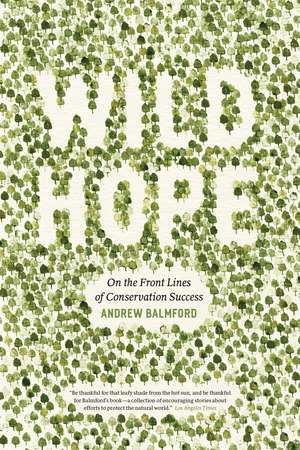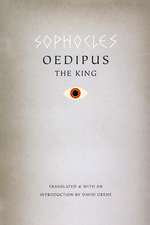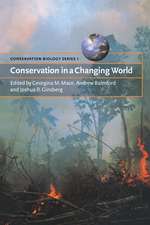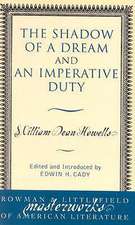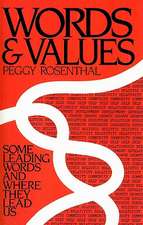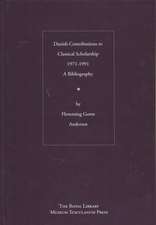Wild Hope: On the Front Lines of Conservation Success
Autor Andrew Balmforden Limba Engleză Paperback – 13 oct 2014
Tropical deforestation. The collapse of fisheries. Unprecedented levels of species extinction. Faced with the plethora of gloom-and-doom headlines about the natural world, we might think that environmental disaster is inevitable. But is there any good news about the environment? Yes, there is, answers Andrew Balmford in Wild Hope, and he offers several powerful stories of successful conservation to prove it. This tragedy is still avoidable, and there are many reasons for hope if we find inspiration in stories of effective environmental recovery.
Wild Hope is organized geographically, with each chapter taking readers to extraordinary places to meet conservation’s heroes and foot soldiers—and to discover the new ideas they are generating about how to make conservation work on our hungry and crowded planet. The journey starts in the floodplains of Assam, where dedicated rangers and exceptionally tolerant villagers have together helped bring Indian rhinos back from the brink of extinction. In the pine forests of the Carolinas, we learn why plantation owners came to resent rare woodpeckers—and what persuaded them to change their minds. In South Africa, Balmford investigates how invading alien plants have been drinking the country dry, and how the Southern Hemisphere’s biggest conservation program is now simultaneously restoring the rivers, saving species, and creating tens of thousands of jobs. The conservation problems Balmford encounters are as diverse as the people and their actions, but together they offer common themes and specific lessons on how to win the battle of conservation—and the one essential ingredient, Balmford shows, is most definitely hope.
Wild Hope, though optimistic, is a clear-eyed view of the difficulties and challenges of conservation. Balmford is fully aware of failed conservation efforts and systematic flaws that make conservation difficult, but he offers here innovative solutions and powerful stories of citizens, governments, and corporations coming together to implement them. A global tour of people and programs working for the planet, Wild Hope is an emboldening green journey.
Preț: 139.66 lei
Nou
Puncte Express: 209
Preț estimativ în valută:
26.74€ • 27.50$ • 22.18£
26.74€ • 27.50$ • 22.18£
Carte disponibilă
Livrare economică 28 ianuarie-11 februarie
Livrare express 14-18 ianuarie pentru 24.65 lei
Preluare comenzi: 021 569.72.76
Specificații
ISBN-13: 9780226036014
ISBN-10: 0226036014
Pagini: 264
Ilustrații: 20 halftones
Dimensiuni: 152 x 229 x 23 mm
Greutate: 0.38 kg
Editura: University of Chicago Press
Colecția University of Chicago Press
ISBN-10: 0226036014
Pagini: 264
Ilustrații: 20 halftones
Dimensiuni: 152 x 229 x 23 mm
Greutate: 0.38 kg
Editura: University of Chicago Press
Colecția University of Chicago Press
Notă biografică
Andrew Balmford is professor of conservation science in the Department of Zoology at the University of Cambridge. He is coeditor of Conservation in a Changing World, and he lives in Ely, England, with his wife, two sons, and a lot of animals.
Cuprins
1. The Glass Half Empty
2. Guarding the Unicorn: Conservation at the Sharp End
3. Ending the Woodpecker Wars
4. Problem Plants, Politics, and Poverty
5. Rewilding Goes Dutch
6. Seeing the Good from the Trees
7. The Greening of a Giant
8. Fishing for a Future
9. The Glass Half Full
Appendix. Stemming the Loss (Or What We Can All Do to Save Nature)
2. Guarding the Unicorn: Conservation at the Sharp End
3. Ending the Woodpecker Wars
4. Problem Plants, Politics, and Poverty
5. Rewilding Goes Dutch
6. Seeing the Good from the Trees
7. The Greening of a Giant
8. Fishing for a Future
9. The Glass Half Full
Appendix. Stemming the Loss (Or What We Can All Do to Save Nature)
Acknowledgments
References
References
Recenzii
“Along the course of a graceful and nuanced journey through the complex world of conservation, Andrew Balmford lovingly tells us about a number of highly positive examples of conservation as practiced in a series of far-flung lands, inspiring and encouraging us to continue building a sustainable world—one in which we will coexist sustainably with nature, nurturing the beauty of our glorious planet and the opportunities that it presents for all.”
“This is an unusual book within its genre. Whilst recognizing the huge acceleration in extinction rates, caused by human activities over the past few centuries, it gives an analytic account—region by region—of growing numbers of successful conservation actions in recent years. It is a very important book, by a very knowledgeable author. Read it.”
“Andrew Balmford provides a little of what we need a lot more of: stories of what’s working. By cleverly choosing different kinds of successes, Balmford shows us that there are many ways to save a cat, so to speak. He also shows that people need incentives. Happily as this book illustrates, conservation has many forms of incentive from which to choose the next successful strategies.”
"Through a series of anecdotes and interviews transmuted into his own first person account, Andrew Balmford makes apparent that the people who have dedicated their lives to saving the environment are just as important as the rich and dynamic habitats they seek to preserve. Never slow and not at all preachy, Wild Hope is self-aware and decidedly accessible in a way seldom seen in today’s conservationist discourse."
"Be thankful for that leafy shade from the hot sun, and be thankful for Andrew Balmford's book—a collection of encouraging stories about efforts to protect the natural world."
“While exercising level-headed optimism at their successes, Andrew Balmford still emphasizes their current struggles and future potential challenges. However, hope is the common thread that binds these projects together and, with each story, it becomes clear that their examples are meant to be admired, justifiably so.”
“Wild Hope provides neither an easy nor a hard solution for best safeguarding biodiversity. Conservation, we learn, succeeds by doing just what works. Balmford’s . . . sincerely impassioned, response makes more neurons fire in the region of the heart than in the head. Nonetheless, perhaps that is just the muscle needed for protecting nature.”
“Amid a steady stream of books with disturbing news of habitat degradation and biodiversity loss, Wild Hope stands out by offering good news and models for a way forward. . . . The book is exceptional for its depiction of enlightened management and as an antidote to despair. Highly recommended.”
“In Wild Hope, Andrew Balmford . . . aims to provide grounds for cautious optimism by detailing seven cases of improvement and seeking lessons and commonalities among them that might be more widely applied. The key feature that unifies Balmford’s examples is the need to understand conservation conflicts from the point of view of the human actors involved, then to fashion a response that engages all sides.”
“Balmford is an astute analyst of just why it works in some places and not in others. Wild Hope will doubtless be taken by many conservation professionals, as well as students, as a textbook. At its close he distils his perceptions into seven ‘ways to win battles’ which include, tellingly, not letting the best be the enemy of the good. . . . While human beings are destroying this planet, our only home, human beings are also trying to save it, and this offers at least a glimmer of the hope in this moving book’s title.”
"In beautiful prose, Andrew Balmford takes us on an expedition to six continents where he interviews the people behind the successes and comes up with their defining characteristics. People are ultimately responsible for destroying nature through overharvesting, direct destruction, and toxification, but people are also those who can, and must, reverse the decline."
"Andrew Balmford, who is a professor of conservation at Cambridge University, writes beautifully, but more important still, he sees his whole subject as if from a great height. The book is episodic in structure, as he investigates one project after another, and disparate in its sense of geography and scale, as he moves from a town-based afforestation scheme in Ecuador to multi-billion-dollar government programmes in Europe. Yet he is able to weave the various narratives into a single vision. He is also deeply alive to the balance we need to strike between hope on the one hand, and awareness of the hard facts on the other."
